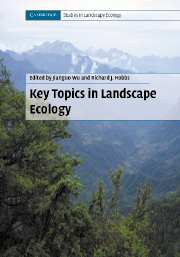1 - Perspectives and prospects of landscape ecology
Published online by Cambridge University Press: 12 January 2010
Summary
Introduction
Landscape ecology has rapidly established itself as an interdisciplinary research field worldwide in the past few decades. However, diversification in perspectives and approaches has apparently caused some concerns with the “identity” of the field in recent years. For example, Wiens (1999) stated that “landscape ecology continues to suffer from something of an identity crisis,” while Moss (1999) warned that landscape ecology's “healthy, youthful development will be cut off before it matures if it does not recognize and develop its own distinctive core and focus.” As landscape ecologists, we feel that we should not be particularly worried about the identity or the fate of the field. Its identity is to some extent self-defining through the activities that people calling themselves landscape ecologists undertake, and its fate will be determined by its utility and its ability to provide techniques, approaches, and applications which help tackle the complex environmental management challenges facing humanity. However, we do think that, after two decades of rapid developments in both theory and practice, landscape ecology can benefit from a forward-looking introspection.
For example, several questions may be asked to address some of the concerns and challenges this field now faces. What is the identity of landscape ecology that it is losing or that has never been established? Given the multidisciplinary origins and goals of the field, is it possible for landscape ecology to have “its own distinctive core and focus?” If so, what would it be?
- Type
- Chapter
- Information
- Key Topics in Landscape Ecology , pp. 3 - 8Publisher: Cambridge University PressPrint publication year: 2007
References
- 3
- Cited by

